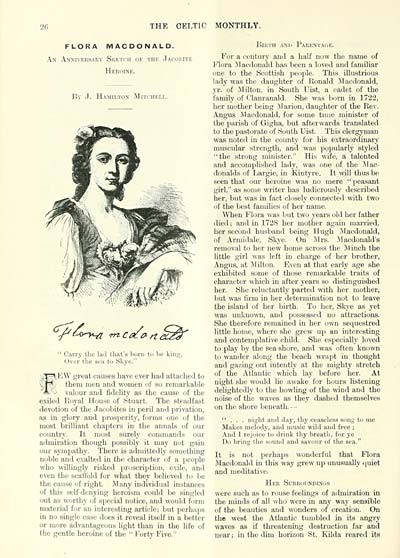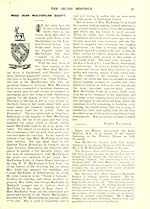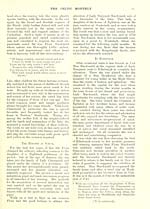Blair Collection > Celtic monthly > Volume 5, 1897
(46)
Download files
Complete book:
Individual page:
Thumbnail gallery: Grid view | List view

2r.
THE CELTIC MONTHLY.
FLORA MACDONALD.
An AifNn"ERS.ARy Skelth of ■iiik .Tai'oi;ite
Heroine.
By J. Hajiilton Mitchele.
^Uyn<^ ^c^an^::^
" Carry the lad that's liorii tu be king,
Over the sea to Skye."
Mi- J val
T^jEW great causes have ever had attached to
them men and women of so remarkable
iilour and fidelity as the cause of the
exiled Eoyal House of Stuart. The steadfast
devotion of the Jacobites in peril and privation,
as in glory and prosperity, forms one of the
most brilliant chapters in the annals of our
country. It most surely commands our
admiration though possibly it may not gain
our symjiathy. There is admittedly something
noble and exalted in the character of a people
who willingly risked proscription, exile, and
even the scaffold for what they believed to be
the cause of right. Many individual instances
of this self-denying heroism could be singled
out as worthy of special notice, and would form
material for an interesting article; but perhaps
in no single case does it reveal itself in a better
or more advantageous light than in the life of
the gentle heroine of the " i"orty-Five."
BlIiTH ANI> PaRENIAUE.
For a conturj- and a half now the name of
Flora .Alacdonald has been a loved and familiar
one to the Scottish people. This illustrious
lady was the daughter of Konald .Macdonald,
yr. of Jlilton, in South Uist, a cadet of the
family of Clauranald. She was born in 1722,
her mother being Marion, daughter of the Rev.
Angus Macdonald, for some tnue minister of
the parish of Gigha, but afterwards translated
to the pastorate of South Uist. This clergyman
was noted in the county for his extraordinary
muscular strength, and was popularly styled
"the strong minister." His wife, a talented
and accomplished lady, was one of the Mac-
donalds of Largie, in Kintyre. It will thus be
seen that our heroine was no mere "peasant
girl," as some writer has ludicrously described
her, but was in fact closely connected with two
of the best families of her name.
When Flora \vas but two years old her father
died ; and in 1728 her mother again married,
her second husband being Hugh IMacdonald,
of Armidale, Skye. On Mrs. Macdonald's
removal to her new home across the IM inch the
little girl was left in charge of her brother,
Angus, at ]\liltou. Even at that early age she
exhibited some of those remarkable traits of
character which in after years so distinguished
her. She reluctantly parted with her mother,
but was lirm in her determination not to leave
the island of her birth. To her, Skj'e as yet
was unknown, and possessed no attractions.
She therefore remained in her own sequestred
little home, where she grew up an interesting
and contemplative child. She especially loved
to play by the sea shore, and was often known
to wander along the beach wrajit in thought
and gazing out intently at the mighty stretch
of the Atlantic which lay before her. At
night she woidd lie a\vake for hours listening
delightedly to the howling of the wind and the
noise of the waves as they dashed themselves
on the shore beneath. —
"... night and day, thy ceaseless song to me
Makes melody, and music wild and free ;
And I rejoice to drink thy breath, for ye
Do bring the sound and savour of the sea."
It is not perhaps wonderful that Flora
JNlacdonald in this way grew up unusually quiet
and meditative.
Her Surroundings
were such as to rouse feelings of admiration in
the minds of all who were in any way sensible
of the beauties and wonders of creation. On
the west the Atlantic tumbled in its angry
waves as if threatening destruction far and
near : in the dim horizon St. Kilda reared its
THE CELTIC MONTHLY.
FLORA MACDONALD.
An AifNn"ERS.ARy Skelth of ■iiik .Tai'oi;ite
Heroine.
By J. Hajiilton Mitchele.
^Uyn<^ ^c^an^::^
" Carry the lad that's liorii tu be king,
Over the sea to Skye."
Mi- J val
T^jEW great causes have ever had attached to
them men and women of so remarkable
iilour and fidelity as the cause of the
exiled Eoyal House of Stuart. The steadfast
devotion of the Jacobites in peril and privation,
as in glory and prosperity, forms one of the
most brilliant chapters in the annals of our
country. It most surely commands our
admiration though possibly it may not gain
our symjiathy. There is admittedly something
noble and exalted in the character of a people
who willingly risked proscription, exile, and
even the scaffold for what they believed to be
the cause of right. Many individual instances
of this self-denying heroism could be singled
out as worthy of special notice, and would form
material for an interesting article; but perhaps
in no single case does it reveal itself in a better
or more advantageous light than in the life of
the gentle heroine of the " i"orty-Five."
BlIiTH ANI> PaRENIAUE.
For a conturj- and a half now the name of
Flora .Alacdonald has been a loved and familiar
one to the Scottish people. This illustrious
lady was the daughter of Konald .Macdonald,
yr. of Jlilton, in South Uist, a cadet of the
family of Clauranald. She was born in 1722,
her mother being Marion, daughter of the Rev.
Angus Macdonald, for some tnue minister of
the parish of Gigha, but afterwards translated
to the pastorate of South Uist. This clergyman
was noted in the county for his extraordinary
muscular strength, and was popularly styled
"the strong minister." His wife, a talented
and accomplished lady, was one of the Mac-
donalds of Largie, in Kintyre. It will thus be
seen that our heroine was no mere "peasant
girl," as some writer has ludicrously described
her, but was in fact closely connected with two
of the best families of her name.
When Flora \vas but two years old her father
died ; and in 1728 her mother again married,
her second husband being Hugh IMacdonald,
of Armidale, Skye. On Mrs. Macdonald's
removal to her new home across the IM inch the
little girl was left in charge of her brother,
Angus, at ]\liltou. Even at that early age she
exhibited some of those remarkable traits of
character which in after years so distinguished
her. She reluctantly parted with her mother,
but was lirm in her determination not to leave
the island of her birth. To her, Skj'e as yet
was unknown, and possessed no attractions.
She therefore remained in her own sequestred
little home, where she grew up an interesting
and contemplative child. She especially loved
to play by the sea shore, and was often known
to wander along the beach wrajit in thought
and gazing out intently at the mighty stretch
of the Atlantic which lay before her. At
night she woidd lie a\vake for hours listening
delightedly to the howling of the wind and the
noise of the waves as they dashed themselves
on the shore beneath. —
"... night and day, thy ceaseless song to me
Makes melody, and music wild and free ;
And I rejoice to drink thy breath, for ye
Do bring the sound and savour of the sea."
It is not perhaps wonderful that Flora
JNlacdonald in this way grew up unusually quiet
and meditative.
Her Surroundings
were such as to rouse feelings of admiration in
the minds of all who were in any way sensible
of the beauties and wonders of creation. On
the west the Atlantic tumbled in its angry
waves as if threatening destruction far and
near : in the dim horizon St. Kilda reared its
Set display mode to: Large image | Transcription
Images and transcriptions on this page, including medium image downloads, may be used under the Creative Commons Attribution 4.0 International Licence unless otherwise stated. ![]()
| Early Gaelic Book Collections > Blair Collection > Celtic monthly > Volume 5, 1897 > (46) |
|---|
| Permanent URL | https://digital.nls.uk/75851500 |
|---|
| Shelfmark | Blair.57 |
|---|---|
| Additional NLS resources: | |
| Attribution and copyright: |
|
| Description | A selection of books from a collection of more than 500 titles, mostly on religious and literary topics. Also includes some material dealing with other Celtic languages and societies. Collection created towards the end of the 19th century by Lady Evelyn Stewart Murray. |
|---|
| Description | Selected items from five 'Special and Named Printed Collections'. Includes books in Gaelic and other Celtic languages, works about the Gaels, their languages, literature, culture and history. |
|---|

